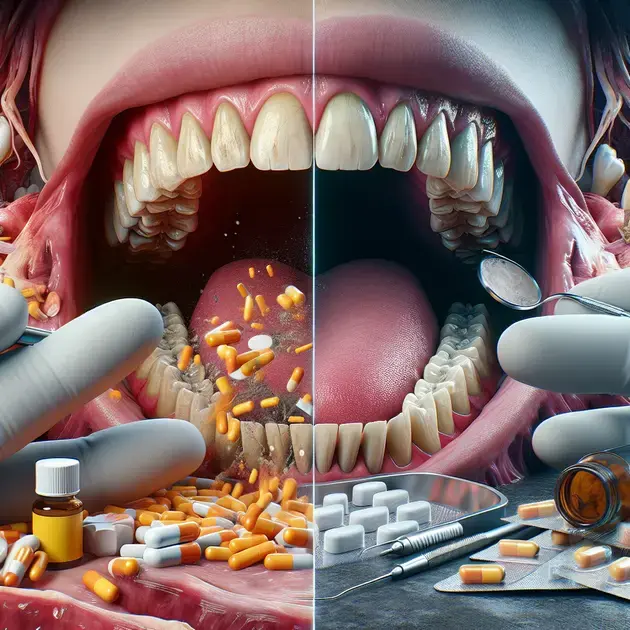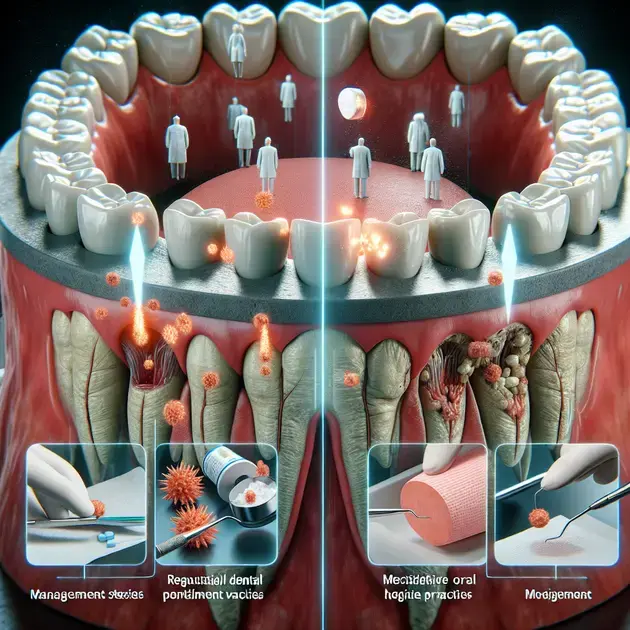When it comes to effectively treating periodontitis, having the right medication is crucial. Understanding the available options and what each entails is essential in managing this common condition. In this post, we will explore the various effective medications for periodontitis and provide you with all the information you need to know.
Periodontitis is a serious gum infection that can damage the soft tissue and destroy the bone that supports your teeth. It is important to seek treatment as soon as possible to prevent further complications. With the advancement in dental medicine, there are now several medications available that have been proven to be effective in treating periodontitis and improving oral health.

Effective Treatment Options for Periodontitis
Periodontitis is a serious gum infection that damages the soft tissue and destroys the bone that supports your teeth. It can lead to tooth loss if not properly treated. Luckily, there are several effective treatment options available to manage and control periodontitis. Here are some key steps to consider:
1. Professional Dental Cleaning
Schedule regular dental cleanings with a periodontist to remove plaque and tartar buildup on your teeth and gums. This is crucial in preventing and managing periodontitis.
2. Scaling and Root Planing
For more advanced cases of periodontitis, a deep cleaning procedure called scaling and root planing may be necessary. This treatment removes plaque and tartar from below the gum line and smoothens the roots to promote healing.
3. Antibiotic Therapy
Antibiotics may be prescribed to control bacterial infections associated with periodontitis. These medications can be in the form of mouth rinses, gels, or oral tablets. Follow your dentist’s instructions carefully when using antibiotics.
4. Surgical Procedures
In severe cases of periodontitis, surgery may be needed to remove infected tissue, reshape the bone, or secure loose teeth. Surgical treatments like flap surgery or bone grafting can help restore oral health.
5. Ongoing Maintenance
Maintaining good oral hygiene practices at home is essential for managing periodontitis. Brush and floss regularly, use an antiseptic mouthwash, and attend follow-up appointments with your periodontist to monitor the progress of your treatment.
Understanding the Role of Medication in Managing Periodontitis
Medication plays a significant role in managing periodontitis by targeting the bacteria that cause gum disease and reducing inflammation in the gums. Here’s a breakdown of the key points to consider:
1. Antibiotics for Periodontitis
Antibiotics such as doxycycline or amoxicillin may be prescribed to control bacterial growth in the gums. These medications can be taken orally or applied directly to the affected areas for effective treatment.
2. Antiseptic Mouthwashes
Antiseptic mouthwashes containing chlorhexidine or essential oils can help reduce plaque and prevent gum infections. Use these mouthwashes as recommended by your dentist to maintain oral hygiene.
3. Anti-Inflammatory Drugs
Nonsteroidal anti-inflammatory drugs (NSAIDs) like ibuprofen can help alleviate pain and swelling associated with periodontitis. Your dentist may recommend these medications for temporary relief during treatment.
4. Prescription-strength Toothpaste
Prescription-strength toothpaste with high fluoride content can strengthen tooth enamel and prevent tooth decay in patients with periodontitis. Use this toothpaste as part of your daily oral care routine.
5. Consultation with a Periodontist
Consulting with a periodontist to discuss the appropriate medication for your specific condition is crucial for effective management of periodontitis. Your dentist will recommend the most suitable treatment plan based on your individual needs.
Key Information about Medication for Periodontitis
Understanding the key information about medication for periodontitis is essential for successful treatment and management of the condition. Here are some important points to keep in mind:
1. Dosage and Administration
Follow the prescribed dosage and administration instructions provided by your dentist or healthcare provider when taking medication for periodontitis. Consistent and proper use of medication is vital for optimal results.
2. Potential Side Effects
Be aware of potential side effects associated with medication for periodontitis, such as gastrointestinal issues, allergic reactions, or drug interactions. Inform your healthcare provider if you experience any adverse reactions.
3. Drug Interactions
Inform your dentist about any medications, supplements, or herbal remedies you are currently taking to avoid potential drug interactions. Certain medications may impact the effectiveness of treatment for periodontitis.
4. Treatment Duration
Understand the recommended treatment duration for medication therapy in managing periodontitis. Completing the full course of medication as prescribed is essential to prevent recurrence of gum infections.
5. Regular Evaluation
Attend regular evaluations and follow-up appointments with your dentist or periodontist to monitor the progress of medication therapy. Adjustments to the treatment plan may be made based on your response to medication.

Understanding the Impact of Medication in Periodontitis Treatment
When it comes to treating periodontitis, medication can play a crucial role in managing the condition and promoting oral health. Understanding the impact of medication in periodontitis treatment is essential for both patients and healthcare providers. Medications such as antibiotics, antimicrobials, and pain relievers can help control the infection, reduce inflammation, and alleviate discomfort associated with periodontitis.
One of the key benefits of medication in periodontitis treatment is its ability to target the bacteria causing the infection. Antibiotics can effectively kill the harmful bacteria in the gums, allowing the tissues to heal and preventing further damage. Antimicrobial mouth rinses can also be used to reduce plaque and tartar buildup, promoting overall gum health.
It is important to note that medication should be used in conjunction with other periodontal treatments, such as scaling and root planing, to achieve optimal results. Patients should follow their healthcare provider’s instructions carefully and complete the full course of medication to ensure the infection is fully treated.
Overall, understanding the impact of medication in periodontitis treatment can help patients make informed decisions about their oral health and improve their overall well-being.
Choosing the Right Medication for Your Periodontal Health
When it comes to selecting medication for your periodontal health, it is important to consider various factors to ensure effective treatment. The right medication can help control the infection, reduce inflammation, and promote healing of the gums. Consulting with a healthcare provider specializing in periodontal care is crucial in determining the most suitable medication for your specific case.
Antibiotics are commonly prescribed for periodontitis treatment to target the bacteria causing the infection. The type and dosage of antibiotics can vary depending on the severity of the infection and the patient’s overall health. Anti-inflammatory medication can also be beneficial in reducing swelling and discomfort in the gums.
In some cases, antimicrobial mouth rinses or gels may be recommended to complement other treatments and improve gum health. It is important to inform your healthcare provider of any allergies or medical conditions before starting any medication for periodontitis.
Choosing the right medication for your periodontal health involves a personalized approach that takes into account your unique needs and ensures the best possible outcome for your oral health.
Tips for Effective Medication Management in Periodontitis
Managing medication for periodontitis requires careful attention to detail and adherence to your healthcare provider’s recommendations. Here are some tips for effective medication management in periodontitis:
1. Follow Your Provider’s Instructions:
It is crucial to follow your healthcare provider’s instructions regarding medication dosage, frequency, and duration. Skipping doses or stopping medication prematurely can reduce the effectiveness of treatment.
2. Keep a Medication Journal:
Recording the medications you are taking, along with their dosages and schedules, can help you stay organized and ensure you are taking the right medication at the right time.
3. Monitor for Side Effects:
Be aware of any potential side effects of the medication and report them to your healthcare provider promptly. Severe side effects should be addressed immediately.
4. Avoid Self-Medication:
Do not self-prescribe or adjust your medication without consulting your healthcare provider. They will be able to provide guidance on the most appropriate treatment for your condition.
5. Attend Follow-Up Appointments:
Regularly scheduled appointments with your healthcare provider are essential for monitoring your progress and adjusting your medication as needed. Keep all follow-up appointments to ensure the success of your treatment.
Conclusion
In conclusion, the impact of medication in periodontitis treatment is paramount in managing the condition effectively and improving oral health. Medications such as antibiotics, antimicrobials, and pain relievers play a crucial role in controlling the infection, reducing inflammation, and alleviating discomfort associated with periodontitis. By targeting the harmful bacteria causing the infection, antibiotics help heal the gums and prevent further damage, while antimicrobial mouth rinses aid in reducing plaque and tartar buildup, contributing to overall gum health.
Additionally, choosing the right medication for your periodontal health is crucial for successful treatment. Factors such as the severity of the infection and your overall health must be considered when selecting antibiotics or anti-inflammatory medication. Consulting with a specialized healthcare provider in periodontal care is essential to determine the most suitable medication for your individual case, ensuring optimal outcomes and promoting gum healing.
Furthermore, effective medication management in periodontitis is key to a successful treatment plan. Following your healthcare provider’s instructions diligently regarding dosage, frequency, and duration is vital. Keeping a medication journal, monitoring for potential side effects, and avoiding self-medication are important steps in managing medication effectively. Regularly attending follow-up appointments for progress monitoring and potential adjustments in medication is crucial for the overall success of your treatment journey.



